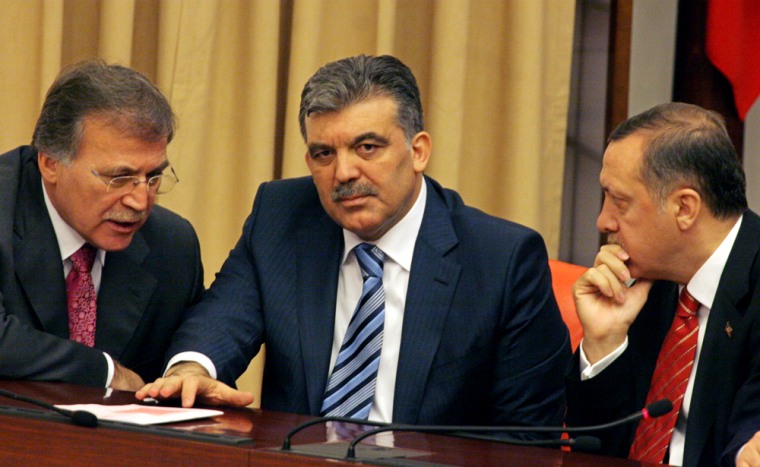The Islamic-rooted government suffered another setback Sunday when parliament failed again to reach a quorum to elect its presidential candidate in an ongoing rift between the ruling party and the secular establishment.
Foreign Minister Abdullah Gul, a close ally of the prime minister, withdrew from the presidential race Sunday — a sign that the government was giving up efforts to push Gul’s candidacy through Parliament in defiance of strong secularist opposition.
“There is no point in holding a new round of election,” Gul said after the parliamentary session Sunday. “Parliament is deadlocked. The correct thing now is for the people to elect” the new president.
Prime Minister Recep Tayyip Erdogan, already looking to elections set for July 22, is amending the constitution to open the way for the president to be elected by popular vote, instead of parliament.
The presidential elections have exposed a deepening divide between pro-secular groups and supporters of Erdogan’s party. Secularists oppose Gul’s candidacy, fearing that Erdogan’s party will expand its control and impose religion on society.
Gul denies hidden agenda
In the May 14 issue of Newsweek magazine, Gul rejected the idea that his government has a hidden Islamic agenda he would implement if elected.
“We have worked harder than any party in Turkey’s history to make Turkey a member of the EU,” Gul told Newsweek. “Why would we do this if we are trying to Islamize Turkey?”
Parliament on Sunday was short of the 367 legislators need to vote because secular lawmakers from the opposition boycotted the session. The attempt was a repeat of a first-round of elections which the Constitutional Court, siding with the secular opposition, canceled last week on grounds that there was no quorum.
Gul has said he could stand for president if the vote went to the people, but did not say Sunday if he intended to run in a popular vote. He told the Financial Times on Friday he believed he had the support of 70 percent of the public.
Hundreds of thousands took to the streets of Ankara and Istanbul in recent weeks to pressure Erdogan against nominating a presidential candidate with Islamic leanings. Thousands attended protests in smaller cities in western Turkey, keeping up the pressure on Erdogan.
The presidency, which has been a stronghold for secularists, holds significant powers, including the power to veto legislation.
Secularism enforced
Many fear that Erdogan’s party could use control of both Parliament and the presidency to erode the separation of state and religion, and curb secular freedoms such as women’s rights.
Turkey’s secularism is enshrined in the constitution and guarded by the judiciary and the powerful military, which has threatened to intervene to ensure that secularism is enforced.
Erdogan’s ruling party, an advocate of European Union membership, rejects the label of Islamist and has done more than many other governments to introduce Western reforms to the country.
His government called for early elections in reaction to the court’s decision last week to invalidate the first-round of presidential voting.
A parliamentary committee approved a measure late Saturday allowing a popular election for president.
It also approved several other amendments — reducing the presidential term from seven years to five, allowing the president to run for a second term, and holding general elections every four years instead of five.
It was not immediately clear when the amendments would come to the floor.
Legislators from Erdogan’s party have said, if the amendment is passed on time, Turkey could hold general and presidential elections on the same day.
Erdogan was jailed in 1999 for challenging Turkey’s secular system, and many of his party’s members, including Gul, are pious Muslims who made their careers in the country’s Islamist political movement.
“Of course ... Turkey is a Muslim country,” Gul told Newsweek. “But that doesn’t mean we should mix Islam and politics. It would be bad for both.”
2 soldiers, 2 rebels killed
Turkish troops killed two separatist Kurdish rebels Sunday in a clash in southern Turkey, the state-run Anatolia news agency reported. Two soldiers were also killed in separate fighting in the southeast of the country.
The rebels were killed in the southern province of Hatay, which borders Syria, after they ignored soldiers' call for them to surrender, Anatolia reported.
The soldiers died in a fight in Sirnak province, which borders Iraq, late Saturday, when a group of rebels opened fire on the security forces, the agency reported.
More than 37,000 people have died in fighting since autonomy-seeking rebels of the Kurdistan Workers Party, or PKK, took up arms against the Turkish state in 1984.
Last month, the head of Turkey's armed forces said several large-scale offensives against the rebels had been launched in the southeast of the country, and requested permission to launch an operation into northern Iraq to attack the guerrillas at their bases there.
